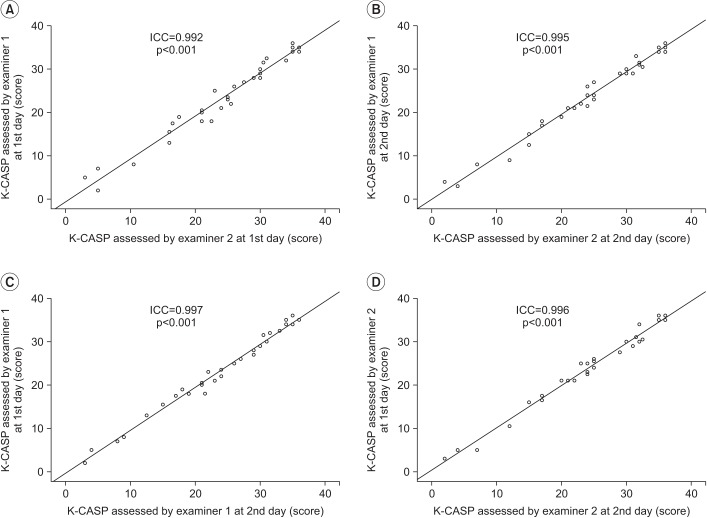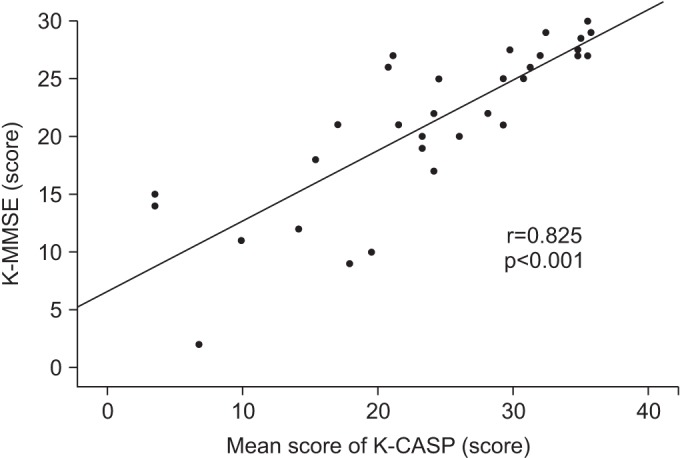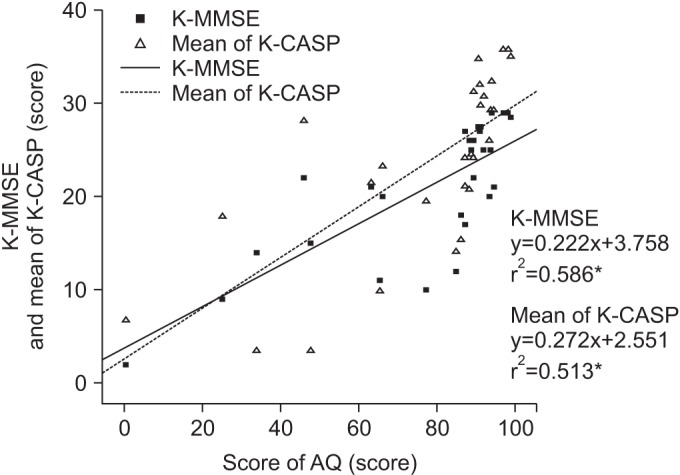Ann Rehabil Med.
2017 Jun;41(3):362-375. 10.5535/arm.2017.41.3.362.
The Korean Version of the Cognitive Assessment Scale for Stroke Patients (K-CASP): A Reliability and Validity Study
- Affiliations
-
- 1Department of Rehabilitation Medicine, Seoul St. Mary's Hospital, College of Medicine, The Catholic University of Korea, Seoul, Korea. drpjh@catholic.ac.kr
- 2HU&U Hospital, Bucheon, Korea.
- KMID: 2389451
- DOI: http://doi.org/10.5535/arm.2017.41.3.362
Abstract
OBJECTIVE
To develop the Korean version of the Cognitive Assessment Scale for Stroke Patients (K-CASP) and to evaluate the test reliability and validity of the K-CASP in stroke patients.
METHODS
The original CASP was translated into Korean, back-translated into English, then reviewed and compared with the original version. Thirty-three stroke patients were assessed independently by two examiners using the K-CASP twice, with a one-day interval, for a total of four test results. To evaluate the reliability of the K-CASP, intra-class correlation coefficients were used. Pearson correlations were calculated and simple regression analyses performed with the Korean version of Mini-Mental State Examination (K-MMSE) and the aphasia quotient (AQ) to assess the validity.
RESULTS
The mean score was 24.42±9.47 (total score 36) for the K-CASP and 21.50±7.01 (total score 30) for the K-MMSE. The inter-rater correlation coefficients of the K-CASP were 0.992 on the first day and 0.995 on the second day. The intra-rater correlation coefficients of the K-CASP were 0.997 for examiner 1 and 0.996 for examiner 2. In the Pearson correlation analysis, the K-CASP score significantly correlated with the K-MMSE score (r=0.825, p<0.001). The coefficients of determination (r²) of the AQ were 0.586 for the K-MMSE and 0.513 for the K-CASP in the simple regression analysis.
CONCLUSION
The K-CASP is a reliable and valid instrument for cognitive dysfunction screening in post-stroke patients. It is more applicable than other cognitive assessment tools in stroke patients with aphasia.
MeSH Terms
Figure
Reference
-
1. Pendlebury ST, Rothwell PM. Prevalence, incidence, and factors associated with pre-stroke and post-stroke dementia: a systematic review and meta-analysis. Lancet Neurol. 2009; 8:1006–1018. PMID: 19782001.
Article2. Tatemichi TK, Paik M, Bagiella E, Desmond DW, Pirro M, Hanzawa LK. Dementia after stroke is a predictor of long-term survival. Stroke. 1994; 25:1915–1919. PMID: 8091433.
Article3. Pasquini M, Leys D, Rousseaux M, Pasquier F, Henon H. Influence of cognitive impairment on the institutionalisation rate 3 years after a stroke. J Neurol Neurosurg Psychiatry. 2007; 78:56–59. PMID: 16952914.
Article4. Lees R, Selvarajah J, Fenton C, Pendlebury ST, Langhorne P, Stott DJ, et al. Test accuracy of cognitive screening tests for diagnosis of dementia and multidomain cognitive impairment in stroke. Stroke. 2014; 45:3008–3018. PMID: 25190446.
Article5. Kwon YC, Park JH. Korean version of Mini-Mental State Examination (MMSE-K). Part I: Development of the test for the elderly. J Korean Neuropsychiatr Assoc. 1989; 28:125–135.6. Pendlebury ST, Cuthbertson FC, Welch SJ, Mehta Z, Rothwell PM. Underestimation of cognitive impairment by Mini-Mental State Examination versus the Montreal Cognitive Assessment in patients with transient ischemic attack and stroke: a population-based study. Stroke. 2010; 41:1290–1293. PMID: 20378863.7. Brookes RL, Hannesdottir K, Lawrence R, Morris RG, Markus HS. Brief Memory and Executive Test: evaluation of a new screening test for cognitive impairment due to small vessel disease. Age Ageing. 2012; 41:212–218. PMID: 22267862.
Article8. Barnay JL, Wauquiez G, Bonnin-Koang HY, Anquetil C, Perennou D, Piscicelli C, et al. Feasibility of the cognitive assessment scale for stroke patients (CASP) vs. MMSE and MoCA in aphasic left hemispheric stroke patients. Ann Phys Rehabil Med. 2014; 57:422–435. PMID: 24953703.
Article9. Demeyere N, Riddoch MJ, Slavkova ED, Jones K, Reckless I, Mathieson P, et al. Domain-specific versus generalized cognitive screening in acute stroke. J Neurol. 2016; 263:306–315. PMID: 26588918.
Article10. Benaim C, Barnay JL, Wauquiez G, Bonnin-Koang HY, Anquetil C, Perennou D, et al. The Cognitive Assessment scale for Stroke Patients (CASP) vs. MMSE and MoCA in non-aphasic hemispheric stroke patients. Ann Phys Rehabil Med. 2015; 58:78–85. PMID: 25766087.
Article11. Snodgrass JG, Vanderwart M. A standardized set of 260 pictures: norms for name agreement, image agreement, familiarity, and visual complexity. J Exp Psychol Hum Learn. 1980; 6:174–215. PMID: 7373248.
Article12. Azouvi P, Bartolomeo P, Beis JM, Perennou D, Pradat-Diehl P, Rousseaux M. A battery of tests for the quantitative assessment of unilateral neglect. Restor Neurol Neurosci. 2006; 24:273–285. PMID: 17119304.13. Dubois B, Slachevsky A, Litvan I, Pillon B. The FAB: a Frontal Assessment Battery at bedside. Neurology. 2000; 55:1621–1626. PMID: 11113214.
Article14. Sousa VD, Rojjanasrirat W. Translation, adaptation and validation of instruments or scales for use in cross-cultural health care research: a clear and user-friendly guideline. J Eval Clin Pract. 2011; 17:268–274. PMID: 20874835.
Article15. Godefroy O, Fickl A, Roussel M, Auribault C, Bugnicourt JM, Lamy C, et al. Is the Montreal Cognitive Assessment superior to the Mini-Mental State Examination to detect poststroke cognitive impairment? A study with neuropsychological evaluation. Stroke. 2011; 42:1712–1716. PMID: 21474808.
Article16. Giordano PC, Alexandre NM, Rodrigues RC, Coluci MZ. The Pain Disability Questionnaire: a reliability and validity study. Rev Lat Am Enfermagem. 2012; 20:76–83. PMID: 22481724.
Article17. Kertesz A, Poole E. The aphasia quotient: the taxonomic approach to measurement of aphasic disability. 1974. Can J Neurol Sci. 2004; 31:175–184. PMID: 15198441.18. Leys D, Henon H, Mackowiak-Cordoliani MA, Pasquier F. Poststroke dementia. Lancet Neurol. 2005; 4:752–759. PMID: 16239182.
Article19. Babulal GM, Huskey TN, Roe CM, Goette SA, Connor LT. Cognitive impairments and mood disruptions negatively impact instrumental activities of daily living performance in the first three months after a first stroke. Top Stroke Rehabil. 2015; 22:144–151. PMID: 25936546.
Article20. Park J, Lee G, Lee SU, Jung SH. The impact of acute phase domain-specific cognitive function on post-stroke functional recovery. Ann Rehabil Med. 2016; 40:214–222. PMID: 27152270.
Article21. Jokinen H, Melkas S, Ylikoski R, Pohjasvaara T, Kaste M, Erkinjuntti T, et al. Post-stroke cognitive impairment is common even after successful clinical recovery. Eur J Neurol. 2015; 22:1288–1294. PMID: 26040251.
Article22. Murray LL. Attention and other cognitive deficits in aphasia: presence and relation to language and communication measures. Am J Speech Lang Pathol. 2012; 21:S51–S64. PMID: 22230179.
Article23. Wright HH, Fergadiotis G. Conceptualizing and measuring working memory and its relationship to aphasia. Aphasiology. 2012; 26:258–278. PMID: 22639480.
- Full Text Links
- Actions
-
Cited
- CITED
-
- Close
- Share
- Similar articles
-
- Validation of Korean Version of the Oxford Cognitive Screen (K-OCS), a Post Stroke-Specific Cognitive Screening Tool
- Korean Version of the Stroke Rehabilitation Motivation Scale: Reliability and Validity Evaluation
- Korean Version of the Confidence of Arm and Hand Movement Scale and Its Psychometric Properties
- Development and Clinical Validity of a Mild Vascular Cognitive Impairment Assessment Tool for Korean Stroke Patients
- A Preliminary Study for the Validation of the Korean Version of Psychogeriatric Assessment Scale




